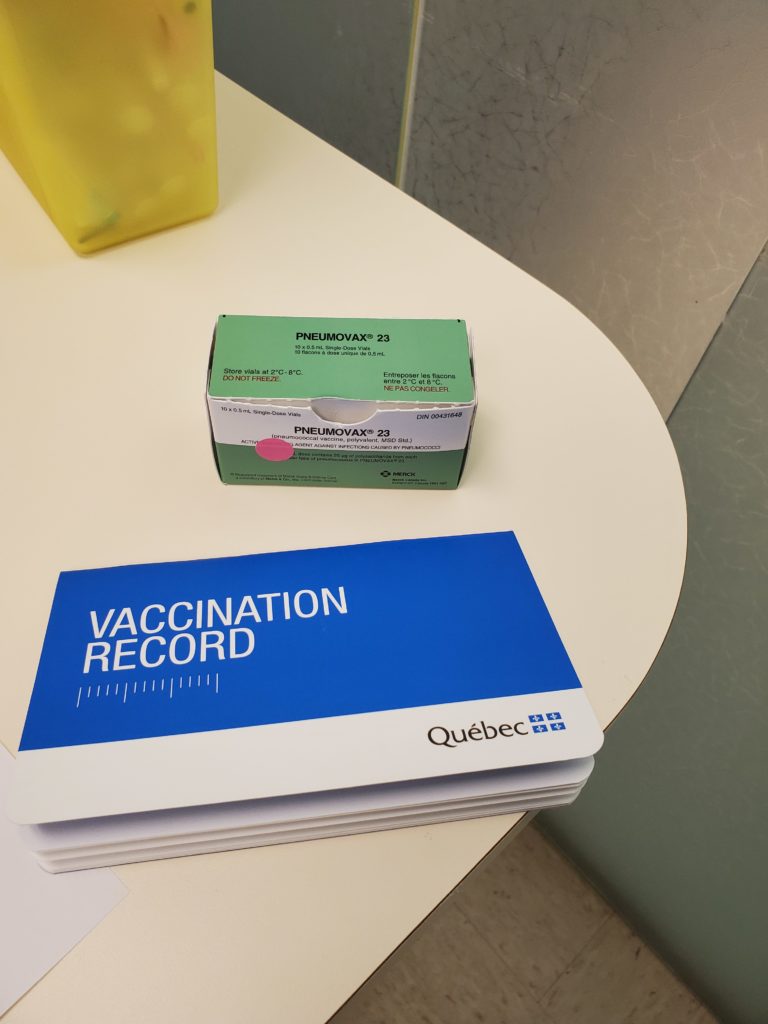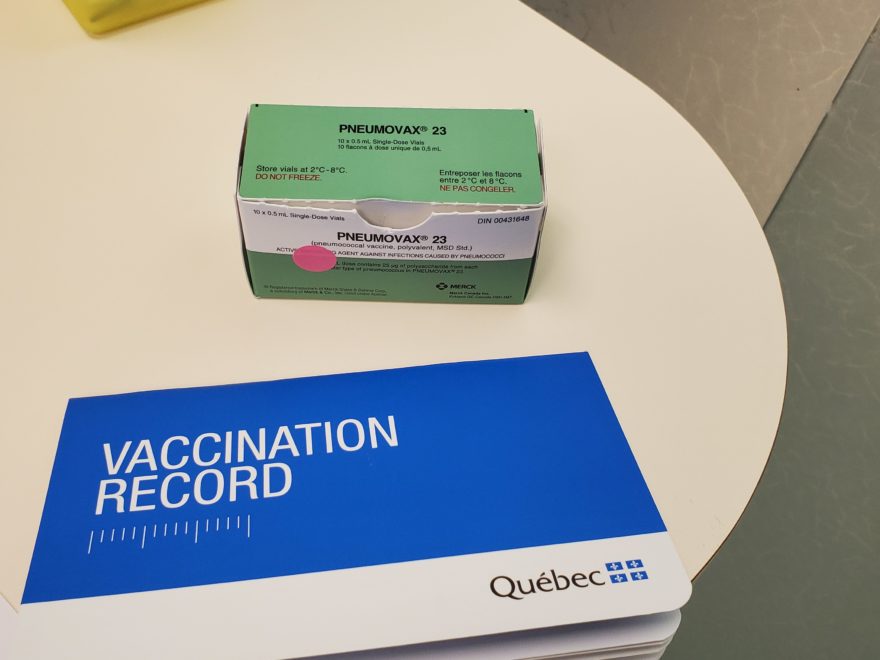It’s been almost two months since the start of the year, and here in Montréal the snow is still thick on the ground. It feels a long way from spring, but today the temperature was above the freezing point for a couple of hours; a nice reminder that winter will be ending in the foreseeable future.
There’s another change coming in the near future, as it was announced today that our provincial government’s Ministry of Health will begin vaccinating members of the public against COVID-19 in this city tomorrow; individuals in nursing homes having already been vaccinated, along with healthcare workers.
This public vaccination program is being rolled out only for people over age 85, to start, and will then slowly progress down the age ranges. The details might differ from one province to another, because healthcare is administered at a provincial level in Canada; although this is done with significant fund transfers from the federal government, each provincial government downplays this part of the equation for their own political gain. Such is Canada’s patchwork of healthcare administration and health insurance!
As with so much of Quebec’s response to the COVID-19 crisis, I’m shocked at how little thought has gone into the planning of this massive immunization program – from the patients’ perspective. For ease of reference I’m referring to each potential vaccinated person as a “patient” in this post. The Quebec government has repeatedly failed to address inequities in access to healthcare from the end-users’ viewpoints, and it’s disheartening to realize that they’ve done the same once again.
In England, the National Health Service (NHS) is contacting each individual – by letter, text or email (1) – to book an appointment when it’s their turn, also by age group, to receive the vaccination. This is meant to ensure that each patient receives this important information in the format best suited for their personal situation; those without access to smartphones or email will receive letters by mail. Those without a fixed address can walk into a local pharmacy or a general practitioner’s office to have their name added to the list and to book an appointment.
In this way, an attempt is made to ensure that no one is left behind due to gaps in access to technology such as smartphones – or stable housing. I’d have expected the Quebec government to take a similar approach, given that their initial focus is on immunizations within the city of Montreal which has well-known impoverished populations and large groups of people lacking stable housing.
A 2016 Public Health report on seniors aged 65 and older in Montreal found that in some areas of the City the “proportion of seniors who never obtained a high-school diploma” was as high as 67% and that as many of 45% of Montreal seniors were “living below the low-income cutoff” (i.e. living in poverty). (2)
Specifically in terms of the initial target group for COVID-19 vaccination – individuals aged 85 and older residing in Montreal – our provincial health authorities are already aware that (emphasis added):
The proportion of very elderly individuals (85 and over) is higher than in the rest of Québec.
Montréal is the most socially disadvantaged region of Québec and more elderly Montrealers have no social support.
Proportionately more seniors in the Montréal health region live in poverty (below the low income cutoff) than those in other urban health regions in Canada, including Toronto, Edmonton and Halifax.” (2)
Given this information, I would have expected that the Quebec Government put in place measures to ensure that its large-scale immunization program would be accessible to the most disadvantaged and vulnerable among our over-85 elders. After all, it’s not as though they haven’t had months to think this through, while waiting for vaccine products to arrive…
Rather than taking time over the past months to determine how best to reach the most vulnerable elders in our society, the Quebec government’s Ministry of Health has instead opted to heighten inequities among our elders. How? By selecting a platform that makes access to vaccination appointments largely inaccessible to these vulnerable proportions of our elder population.
Home WiFi, cell phone service, and smart phones themselves are all very expensive in Canada as compared to other countries with similar economic development. For example, “Canadians pay two to three times more for internet and mobile phone data than do those in other OECD countries.” (3) This puts these tools out of reach of many individuals or families who lived on fixed or limited incomes, including elders who live in poverty – up to 45% of Montreal seniors, as per that 2016 report. As a quick example, neither my dad nor my father-in-law have computers or smartphones – nor do most of the people they know in their own age groups.
What’s the approach being taken for COVID-19 vacation appointments in Montreal, long the epicentre of COVID-19 in Canada? Not only is booking vaccination appointments being left up to individual patients, it’s being done in such a way as to prioritize the most well-off among them.
Unfortunately, the Québec Government’s COVID-19 immunization strategy largely rests on the premise that individuals will log onto a government website to book their vaccination appointments. During a press conference this afternoon, officials from the Ministry of Health and Montreal Mayor’s office were on hand to launch this new immunization campaign.
A few minutes into the launch announcement, these officials seem to have suddenly realized that many Montrealers aged 85 and older don’t have access to the internet… so they began suggesting that family members, friends, and acquaintances ‘assist’ elders by making their vaccination appointments for them.
This would, of course, require that an elder provide their personal health information (PHI) to another person who would then enter it into the Québec Government vaccination website; their health insurance number (a permanent health identification number), and whatever other identifying personal information is required. Most likely their full name, birthdate, address, contact information, and more.
The official statement is (emphasis added) that:
Starting on Thursday at 8 a.m., people 85 and older — or those born in 1936 or before — will be able to make an appointment online at quebec.ca/vaccincovid.
The government is asking family members to help seniors book an appointment online.
Seniors who don’t have a computer or are uncomfortable booking online can call 1-877-644-4545 to book an appointment starting Thursday.
There will be 700 people answering phone calls.” (4)
Throughout the press conference, public health and Ministry of Health officials all urged Montrealers to ‘use the website’ to book their COVID-19 vaccination appointments and stressed that this was ‘the best approach for everyone’.
But it’s not. It’s ‘the best approach’ for the government, to have patients do all the work in securing access to basic healthcare. This, sadly, is how programs seem to always be thought out and administered in Quebec; not by asking what would be the best – the most accessible, equitable, convenient, etc. – for patients but instead by focusing on what’s most convenient for the healthcare system itself.
From my perspective, with a background in both bioethics and patient privacy protection, this planned reliance on a website for COVID-19 vaccination is appalling. Not only has the Quebec government failed to take into account findings of a report on seniors that they commissioned back in 2016, which clearly stated that many “elderly Montrealers have no social support” (2), they’re recommending that elders share their personal health information with “acquaintances” who would then book their appointments.
Can these officials not see that this could create heightened risks of fraud against these vulnerable elders? Worse than that, it means that any elder with access to the internet will be able to log on at any time of day or night to book their vaccination appointment – while the phone lines will be open only during regular business hours.
I think it’s safe to assume that the first waves of available appointments – as they open up for each different age range going forward – will be taken up by those with smartphones and/or personal computers with home internet services. Once again, Quebec will have failed to provide equitable access to those who can’t afford these personal technologies – and they will have done so on purpose.
I’d like to say that I’m surprised, but sadly that’s not the case. Not only has this provincial government repeatedly failed in its duty to provide equitable access to healthcare, including an election promise to resolve long-standing issues in our nursing homes (__), it also seems willing to actively deny reality. Case in point, last year Quebec’s provincial Premier François Legault:
denied, once again, that there was a systemic problem in Quebec.
“I think that there is some discrimination in Quebec, but there’s no systemic discrimination, no system in Quebec of discrimination,” he said, adding “it’s a very small minority of the people who are doing some discrimination”.” (5)
At the same time, however, “he acknowledged a 2019 report, which showed black and Indigenous people were four to five times more likely to be stopped by police than white people” (5) and “Montreal Mayor Valérie Plante acknowledged there is systemic racism in all parts of society” here.
Once again our provincial government, and its leaders, have put their heads in the sand and pretended that well-known issues of inequity exist simply don’t exist. Why? Because, I imagine, it’s easier for them to create an immunization program based on what’s best for them rather than what’s best for their citizens.
Wherever you are, and whatever challenges you face, I wish you safety and well-being as this pandemic continues to evolve around the world. If you’d like to comment on this post or others, please reach out on Twitter or Instagram (you can find my posts on the side or at the bottom of this page, depending on your device). I’ve had to disable the comments feature on the blog, because the ‘mild cognitive impairment’ that has resulted from my rare disease made it impossible for me to manage that feature properly.
As always, thanks so much for stopping by!

References:
(1) NHS England. How you will be contacted for your coronavirus (COVID-19) vaccination. Government of England: Department of Health and Social Care (DHSC); NHS England (website by NHS Digital). Webpage. Updated 22 Feb 2021. Online. Accessed 24 Feb 2021:
https://www.nhs.uk/conditions/coronavirus-covid-19/coronavirus-vaccination/how-you-will-be-contacted/
(2) Direction régionale de santé publique (Public Health Authority); Gouvernement du Québec (Government of Quebec). Profile of Montreal Seniors – Highlights (Report). 2016. PDF available online. Accessed 24 Feb 2021:
https://santemontreal.qc.ca/fileadmin/fichiers/professionnels/DRSP/sujets-a-z/Aines/Portrait_aines_faits-saillants-ANG.pdf
(3) Lynn Desjardins. Already high internet prices going up in Canada. Radio Canada International (RCI); Canadian Broadcasting Corporation (CBC); Government of Canada. ePub 29 Jan 2019. Online. Accessed 24 Feb 2021:
https://www.rcinet.ca/en/2019/01/29/canadians-wireless-services-expensive-increases/
(4) Katherine Wilton. How to get COVID-19 vaccinations in Montreal. Montreal Gazette. ePub 18 Feb 2021; updated 24 Feb 2021. Online. Accessed 24 Feb 2021:
https://montrealgazette.com/news/local-news/how-to-get-covid-19-vaccinations-in-montreal
(5) Claire Loewen. As premier denies systemic racism, black Quebecers point to their lived experience. CBC News; Canadian Broadcasting Corporation (CBC); Government of Canada. ePub 02 Jun 2020. Online. Accessed 24 Feb 2021:
https://www.cbc.ca/news/canada/montreal/systemic-racism-police-brutality-quebec-1.5594071

